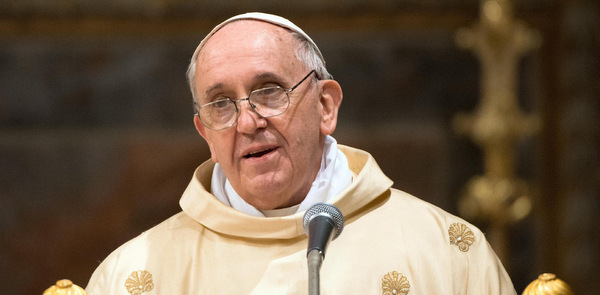

'If we do not confess Jesus Christ, nothing will avail'
Cheridan Sanders
Thursday, March 14, 2013

In these three readings I see that there is something in common: it is movement. In the first reading, movement is the journey [itself]; in the second reading, movement is in the up-building of the Church. In the third, in the Gospel, the movement is in [the act of] profession: walking, building, professing. Walking: the House of Jacob. “O house of Jacob, Come, let us walk in the light of the Lord.” This is the first thing God said to Abraham: “Walk in my presence and be blameless.” Walking: our life is a journey and when we stop, there is something wrong. Walking always, in the presence of the Lord, in the light of the Lord, seeking to live with that blamelessness, which God asks of Abraham, in his promise. Building: to build the Church. There is talk of stones: stones have consistency, but [the stones spoken of are] living stones, stones anointed by the Holy Spirit. Build up the Church, the Bride of Christ, the cornerstone of which is the same Lord. With [every] movement in our lives, let us build! Third, professing: we can walk as much we want, we can build many things, but if we do not confess Jesus Christ, nothing will avail. We will become a pitiful NGO, but not the Church, the Bride of Christ. When one does not walk, one stalls. When one does not built on solid rocks, what happens? What happens is what happens to children on the beach when they make sandcastles: everything collapses, it is without consistency. When one does not profess Jesus Christ - I recall the phrase of Leon Bloy – “Whoever does not pray to God, prays to the devil.” When one does not profess Jesus Christ, one professes the worldliness of the devil. Walking, building-constructing, professing: the thing, however, is not so easy, because in walking, in building, in professing, there are sometimes shake-ups - there are movements that are not part of the path: there are movements that pull us back. This Gospel continues with a special situation. The same Peter who confessed Jesus Christ, says, “You are the Christ, the Son of the living God. I will follow you, but let us not speak of the Cross. This has nothing to do with it.” He says, “I’ll follow you on other ways, that do not include the Cross.” When we walk without the Cross, when we build without the Cross, and when we profess Christ without the Cross, we are not disciples of the Lord. We are worldly, we are bishops, priests, cardinals, Popes, but not disciples of the Lord. I would like that all of us, after these days of grace, might have the courage - the courage - to walk in the presence of the Lord, with the Cross of the Lord: to build the Church on the Blood of the Lord, which is shed on the Cross, and to profess the one glory, Christ Crucified. In this way, the Church will go forward. My hope for all of us is that the Holy Spirit, that the prayer of Our Lady, our Mother, might grant us this grace: to walk, to build, to profess Jesus Christ Crucified. So be it.
Related Articles:
Category: General Posts
Tag: papal transition, Pope Francis
Pray with the Pope Reflection – June 2025
Friday, June 13, 2025
 Fr. Edmund Lo, SJ
Fr. Edmund Lo, SJ
In this month of June, the Holy Father invites us to pray that the world might grow in compassion, that each one of us might find consolation in a personal relationship with Jesus, and from his Heart, learn to have compassion on the world.
Chaplaincy: “Divine Coffee” for Students
Tuesday, June 10, 2025
 Gianpaolo Capozzi
Gianpaolo Capozzi
Gianpaolo gives us a behind the scenes look at his upcoming Behold segment on the York University Catholic Chaplaincy.
Pope Leo XIV’s homily for Pentecost Sunday 2025
Sunday, June 8, 2025
 Pope Leo XIV
Pope Leo XIV
On Sunday, June 8, 2025, Pope Leo XIV celebrated Mass for the Jubilee of Movements, Associations, and New Communities and spoke about how the Holy Spirit helps the apostles overcome "their fear, shatters their inner chains, heals their wounds, anoints them with strength and grants them the courage to go out to all and to proclaim God’s mighty works."
Homily of Pope Leo XIV at the Mass for the Jubilee of Families, Children, Grandparents, and the Elderly
Sunday, June 1, 2025
 Pope Leo XIV
Pope Leo XIV
Pope Leo XIV celebrated Mass for the Jubilee of Families, Children, Grandparents, and the Elderly and referred to Pope Francis and mentioned spouses who have been beatified and canonized, like the parents of St. Therese of the Child Jesus.
Looking back on Rerum Novarum
Monday, May 26, 2025
 Matthew Neugebauer
Matthew Neugebauer
Pope Leo XIV chose his name primarily to highlight his most recent namesake Leo XIII, whose "historic encyclical Rerum Novarum addressed the social question" to the challenges of his time. What concerns does the encyclical address? How does it speak to its time? And what has been its legacy 134 years later?
SUPPORT LABEL
$50
$100
$150
$250
OTHER AMOUNT
DONATE










